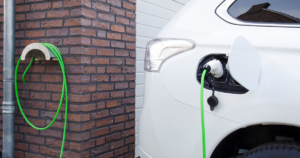
Did you know over 95% of electric car charging is performed at home? Thus our mission here at Comet Electric is to make the entire process of purchasing, installing, and servicing your new home charging station as seamless and effortless as possible.
Electric vehicles (EVs) are a great way to save money and cut down on pollution at the same time. An EV runs off a battery that you can charge at home or at a commercial charging station. Most EVs come with a Level 1 charger that you can plug into any standard 120-volt outlet, but many people want a faster, dedicated charging station at home. Since a Level 1 charger can take hours to charge your car, updating can ensure you are ready to go, even if you only stop at home for a short time before heading out again.
What Kind of Charging Station Do You Need?
How many miles do you drive each week, and does your employer offer car charging?
Let us begin with the fundamentals. We start with these questions since you could be fortunate enough to have a short commute to a workplace with vehicle chargers. If this is you, you may not need to install a charger at home — as long as your boss doesn’t mind you charging the battery for personal usage in addition to commuting.
Is there a public charger near to where you live?
In a similar manner to the last question, if public chargers are located near your house, you may be able to pay to use them instead of installing your own. You should check how popular your local public chargers are on a regular basis, as they may not always be accessible when you need them.
They definitely won’t be able to meet all of your electric car charging needs, but if you live near a public charger and your workplace allows you to charge there, you could be fine.
Which level do you need?
Know that you thought about your travel time and lifestyle. It is time to look into the EV charging station levels. EV charging stations are classified by charging speeds/levels and data communications.
LEVEL 1
The most basic plug-in method to recharge an EV battery is known as Level 1 charging. Level 1’s are small and light. The stations typically weigh less than 5 pounds, making them convenient to move. Many household appliances, from toasters to coffee makers, use this 110V standard outlet, also commonly known as a 120V outlet. Level 1 is the simplest and most inexpensive way to charge your car. It also takes the longest. With Level 1, most cars charge at the rate of 3-7 miles of range per hour.
LEVEL 2
Level 2 chargers are larger and can weigh up to 30 pounds. Some level 2 chargers are smaller and lighter than others, allowing them to be carried around. Some are hardwired, while others are plug-in variants. Plug-in units are preferred since they are easy to install, remove, and transport to other places for charging. Depending on the power amperage, a level 2 charging station can deliver up to 70 miles of range per hour.
LEVEL 3
There are three types of connections for DC rapid charging, often known as level 3 charging. The most popular level 3 charging port is the Combined Charging System, or CCS. Except for Nissan, Mitsubishi, and Tesla, every electric car marketed in North America today with level 3 charging capabilities utilizes the CCS connection.
The CHAdeMO connection is the second type of level 3 charging connector. Nissan and Mitsubishi are presently using CHAdeMO in their electric vehicles. Kia used to use CHAdeMO on the Soul EV, however in 2019 they switched to the CCS connection.
Tesla utilizes its own connector, much like it does for level 1 and level 2 charging, and it also has a unique high-speed DC fast charging network called Superchargers. Because there are no adapters available to allow other electric vehicles to utilize the Supercharger network, only Tesla vehicles may use it.
Comet Electric Your EV Charging Station Installer
Comet Electric is an EV Charging Station installer for home electric vehicle charging stations. Regardless of your home’s existing wiring and panel configuration ( new or old ), we have the electricians with the experience to install exactly what you need to charge your vehicle as safely as possible at home. With older homes, it’s more likely that we may need to install a sub panel or even replace your existing main panel to accommodate the 240-volt receptacle that the Tesla charger uses.
We’re also happy to handle repairs and maintenance services to keep it running at peak performance.
If you want to keep your car fully charged, you can count on our team at Comet Electric. Call today at 724-266-7177 for quick and professional electric vehicle charging station installation, repair, and maintenance in Pittsburgh.[/vc_column_text][/vc_column][/vc_row]


